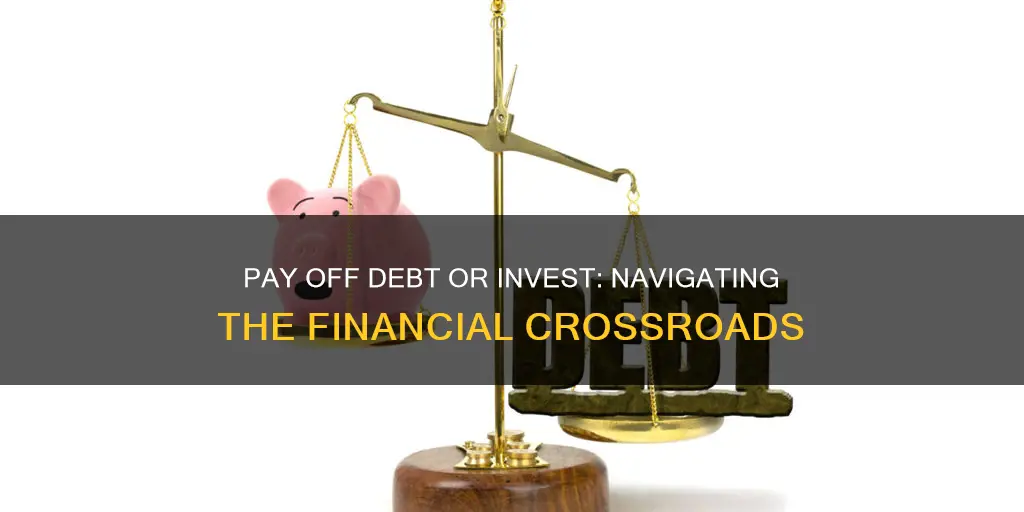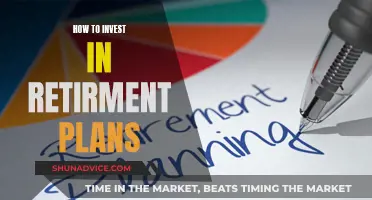
Whether to pay off debt or invest can be a tricky decision. It depends on a number of factors, including the interest rate on your debt, your risk tolerance, and your financial goals. If you have high-interest debt, such as credit card debt, it's usually a good idea to pay that off first, as it can be difficult to find investments that consistently earn a higher return than the interest you're paying. On the other hand, if you have low-interest debt, you may be better off investing, as there's a greater chance that your long-term investment returns will be higher than the interest you're paying on the debt. It's also important to consider your financial security and peace of mind. Paying off debt can improve your credit score, increase your cash flow, and reduce stress and anxiety. However, investing early and often can help you build wealth over time and take advantage of compounding interest. Ultimately, you may decide to take a hybrid approach, balancing both debt repayment and investing to achieve your short-term and long-term financial goals.
| Characteristics | Values |
|---|---|
| Interest rate on debt | If the interest rate on your debt is 6% or more, it is generally recommended to pay off debt before investing. |
| Interest rate on investments | If you can earn more interest on your money by investing than your debts are costing you, then it makes sense to invest. |
| Risk tolerance | If you are comfortable taking the risk that your investments will fluctuate with the markets, you may be more suited to investing. |
| Credit score | Paying off debt can improve your credit score, which can be important if you want to borrow money in the future. |
| Peace of mind | Paying off debt can reduce stress and anxiety, allowing you to focus on other financial, personal, and family goals. |
| Emergency fund | It is recommended to have an emergency fund in place before deciding between paying off debt or investing. |
What You'll Learn

Compare debt cost to expected investment gain
When deciding whether to pay off debt or invest, it is important to compare the cost of the debt to the expected gain from the investment. This involves considering the interest rate on the debt and the potential return on the investment.
If the interest rate on the debt is high, typically above 6-7%, it is generally more advantageous to pay off the debt first before investing. This is because the interest payments on the debt are likely to exceed the returns generated by the investment. For example, credit card debt often carries high interest rates, sometimes around 20% or more, which can quickly accumulate and become difficult to manage. In such cases, prioritising debt repayment can provide a better return on your money than most investments.
On the other hand, if the interest rate on the debt is relatively low, such as 2-3%, it may be more beneficial to keep the money invested. This is because the returns on your investment are likely to exceed the interest costs of the debt. However, it is important to note that investments can be volatile, and there is no guarantee that they will consistently generate positive returns.
Another factor to consider is your risk tolerance. Investing in the stock market or other assets carries inherent risk, and the value of your investments can fluctuate over time. If you are comfortable with taking on this risk and are investing for the long term, then investing may be a suitable option. However, if the idea of potential losses keeps you up at night, then paying off your debt may be a more prudent choice.
Additionally, it is worth considering the potential impact on your credit score. Carrying a large amount of debt, especially credit card debt, can negatively affect your credit score. This, in turn, can lead to higher interest rates on future loans and may even impact your ability to obtain housing or insurance. Therefore, paying down debt can have indirect benefits that should be factored into your decision-making process.
In conclusion, when deciding between paying off debt or investing, it is crucial to compare the cost of the debt to the expected gain from the investment. This involves examining the interest rate on the debt and the potential return on the investment, while also considering your risk tolerance and the potential impact on your credit score. Making an informed decision will help ensure that you make the most of your financial resources and work towards achieving your financial goals.
Invest Now: Where to Put Your Money
You may want to see also

Pay off high-interest debt first
Paying off high-interest debt first is a popular strategy for managing your finances. This approach, also known as the debt avalanche method, can help you save a significant amount of money on interest. Here's why focusing on paying off high-interest debt first is a smart financial move:
Save on Interest Costs
High-interest debt, such as credit card debt, can lead to substantial interest charges over time. By prioritising the repayment of these debts first, you will reduce the overall amount of interest you pay. This translates to more money in your pocket and less money going to financial institutions.
Avoid Compound Interest
Compound interest is when the interest on your debt starts accruing interest. This can quickly snowball, making it challenging to get out of debt. By targeting high-interest debt first, you can prevent compound interest from taking effect, breaking the cycle of debt.
Free Up Funds for Investing
Paying off high-interest debt first can free up more funds for investing in the future. Once you eliminate the burden of high-interest payments, you'll have extra money each month to allocate towards investments or other financial goals.
Reduce Emotional Strain
Debt can be emotionally draining, causing stress and anxiety. By prioritising the repayment of high-interest debt, you can alleviate this strain and improve your overall well-being. A clear mind can lead to better financial decision-making.
Create a Strategy
To effectively tackle your high-interest debt, create a list of your debts, including the amount owed and the interest rate. Focus on the debt with the highest interest rate first and make a plan to aggressively pay it down while maintaining minimum payments on other debts. Once the highest interest debt is cleared, move on to the next highest, and so on.
In summary, paying off high-interest debt first can lead to significant financial and emotional benefits. It can reduce the overall cost of your debt, prevent compound interest from accumulating, and free up funds for future investments. By creating a strategic plan and sticking to it, you can take control of your finances and work towards a more secure financial future.
Buffett's Current Investment Strategy
You may want to see also

Improve your credit score
Improving your credit score is a good goal to have, especially if you plan to apply for a loan to make a major purchase. Here are some tips to improve your credit score:
Make On-Time Payments
Making on-time payments is the most important factor in improving your credit score. Your debt payment history accounts for 35% of your FICO score, and it is crucial to set up autopay for at least the minimum amount due if you are having trouble making payments on time. Late payments can stay on your credit report for up to seven years and hurt your score, but the negative impact will diminish over time as you get caught up and pay on time going forward.
Pay Down Revolving Account Balances
The amount you owe accounts for 30% of your FICO score, and your credit utilization rate is a major element. While some experts recommend keeping your utilization rate below 30%, there is no hard-and-fast rule. Aim to keep it as low as possible, and if you have high credit card balances, make paying them off a priority.
Don't Close Your Oldest Account
The length of your credit history makes up 15% of your FICO score and is influenced by the age of your oldest account and the average age of all your accounts. Closing a credit card can hurt your credit score, especially if it is one of your oldest ones. Even if you no longer use your oldest credit card, consider using it occasionally or putting a small recurring bill on it to keep it active.
Diversify the Types of Credit You Have
Your credit mix accounts for 10% of your FICO score and involves managing different types of credit. For example, someone with credit cards, an auto loan, and a mortgage loan will have a stronger credit mix than someone with just one credit card. Your credit mix will likely improve naturally over time as you apply for different types of credit to meet your financial needs.
Limit New Credit Applications
Every time you apply for credit, the lender will run a hard inquiry on your credit report, which can knock a few points off your score. Multiple inquiries in a short period, especially when applying for credit cards, could have a compounding negative effect. Only apply for credit when you need it, and check if the lender offers prequalification, which can give you an idea of your eligibility without impacting your credit score.
Dispute Inaccurate Information on Your Credit Report
Inaccurate information on your credit report can have a significant negative impact on your score. You are entitled to free weekly credit reports from each of the three major credit bureaus (Equifax, Experian, and TransUnion), so review them for any mistakes and dispute them with the credit bureaus to initiate an investigation.
Become an Authorized User
If you are new to credit or rebuilding your credit score, you can ask a parent or loved one to add you as an authorized user on their credit card, which can have an immediate positive impact on your score. Make sure the account has a positive payment history and a relatively low credit utilization rate.
Strategic Salary Investments: Understanding Allocation Percentages
You may want to see also

Invest for higher returns
If you can earn more interest on your money by investing it than your debts are costing you, then it makes sense to invest. For example, if you have a mortgage with a 5% interest rate and you invest in a stock market index fund returning 10% annually, you will gain more by investing.
However, it is not always that simple. Investments can be volatile, and the index fund might be up 10% one year and down 10% the next. While there are some investments that pay a guaranteed interest rate, such as bank certificates of deposit and US Treasury bills, they tend to have low rates of return that rarely exceed the interest rates charged by credit card companies and other lenders.
Another factor to consider is your risk tolerance. If you are comfortable with the gamble that your investments will fluctuate with the markets, then you are a better candidate for investing than someone who would worry about market movements.
If you are paying off debt, it is essential to distinguish between different types of debt. Most sources agree that high-interest credit card debt should be paid off as quickly as possible. Credit card interest rates are often around 20%, and few investments can match this rate of return.
However, other types of debt, such as student loans and mortgages, tend to have lower interest rates, and you do not need to be as aggressive in paying them off. According to the US Securities and Exchange Commission, a good rule of thumb is to prioritise debts with an interest rate of 8% or higher that lack any tax advantages.
Additionally, it is crucial to consider your retirement timeline. While it is generally best to avoid bringing debt into retirement, some types of debt, such as a mortgage, are more acceptable than others. Credit card debt, on the other hand, does not offer any value and can negatively impact your cash flow and net worth.
Therefore, finding a balance between paying off debt and investing for retirement is essential. Here are some steps to help you achieve this balance:
- Establish an emergency fund: Create an emergency savings fund that can cover your expenses for at least six months. This will help you avoid racking up more debt in case of unexpected expenses.
- Consider debt relief options: Establish a debt management plan to help lower your debt and simplify your bills. A debt management counsellor can negotiate with creditors on your behalf to reduce your monthly payments and interest charges, freeing up money for investing.
- Find a side hustle: Increasing your income can help you eliminate debt more quickly and generate cash to invest. With the gig economy, finding a side job that fits your routine has never been easier.
Remember, investing for higher returns can be a great strategy, but it is important to carefully consider your financial situation, risk tolerance, and retirement goals when making decisions about paying off debt and investing.
Where to Invest: Industries to Back Now
You may want to see also

Adopt a hybrid approach
Adopting a hybrid approach to paying off debt and investing can be a great way to balance your short-term and long-term financial goals. Here are some key considerations for implementing this strategy effectively:
Evaluate Your Debt and Interest Rates
Start by assessing your debt situation. Calculate the total debt you owe and identify the interest rates associated with each debt. Credit cards often carry high interest rates, making them a priority for repayment. Focus on clearing debts with the highest interest rates first to minimize the amount you pay in interest over time.
Establish an Emergency Fund
Before investing, it's crucial to have a financial safety net. Build an emergency fund that can cover your essential expenses for at least six months. This fund will provide a buffer in case of unexpected costs or loss of income, preventing you from falling deeper into debt.
Invest in Your Retirement
Investing early on is essential for building wealth over time and taking advantage of compounding interest. Consider contributing to a tax-advantaged retirement account, such as a 401(k) or IRA, to maximize your investment growth potential. Many employers offer matching contributions to these accounts, so take advantage of this benefit if possible.
Split Your Monthly Payments
You don't have to choose exclusively between paying off debt and investing. Split your monthly payments to work towards both goals simultaneously. For example, if you can afford to pay $325 per month towards your debt, consider allocating $200 for debt repayment and investing the remaining $125 in your retirement account.
Take Advantage of Tax Benefits
Investing in a retirement account can provide tax benefits. Ask your employer to reduce your monthly taxable income to reflect your retirement contributions, effectively increasing your take-home pay. Additionally, any income tax refunds you receive can be used to make additional debt payments or reinvested into your retirement account.
Monitor Your Progress and Adjust
Regularly review your financial situation and adjust your strategy as needed. As your financial circumstances change, you may need to allocate more funds towards debt repayment or increase your investments. This adaptive approach ensures that you stay on track with your short-term and long-term goals.
Adopting a hybrid approach allows you to make progress on multiple financial fronts. It's a balanced strategy that recognizes the importance of both paying off debt and investing for the future.
Madoff's Victims: A Global Reach
You may want to see also
Frequently asked questions
If you have high-interest debt, such as credit card debt, it is generally recommended to pay that off first before investing. Credit card interest rates can be very high, often around 20% or more, and few investments can match this rate of return.
If you have debt with a low-interest rate, it may make more sense to invest instead of paying it off early. This is because there is a greater chance that your long-term investing returns will be higher than the interest you are paying on your debt.
Yes, you can adopt a hybrid approach by putting some money into savings or investments while also working to pay off your debt. This can help you balance your short-term and long-term financial goals and give you more flexibility to adjust your strategy as your financial situation changes.







